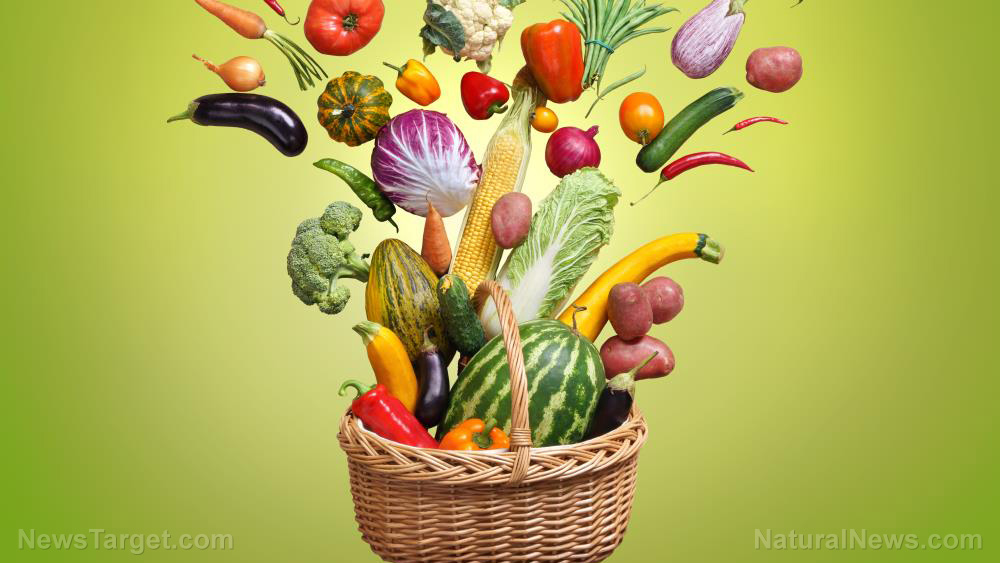
Advertisement
It’s no secret that eating a diet rich in fresh fruits and vegetables keeps you healthy and strong. As you know, fruits and veggies are chock-full of nutrients that help prevent various diseases, keep your body functioning properly and increase your longevity.
But how much should you eat to reap these health benefits? According to a study, you should consume at least 10 servings of fruits and vegetables because this amount confers the greatest benefit.
Eating 10 servings of fruits and vegetables daily lowers disease and mortality risk
For their study, researchers analyzed 95 previous studies on fruit and vegetable intake which involved a total of two million people and their related health problems. In all, there were:
- 43,000 cases of heart disease
- 47,000 cases of stroke
- 81,000 cases of cardiovascular disease
- 112,000 cases of cancer
- 94,000 deaths
The researchers’ analysis showed that these health problems could be prevented by consuming at least 800 grams of fruits and vegetables daily. That amount is equivalent to 10 servings every day, or twice the current recommended dietary guideline for fruits and vegetables.
In particular, the analysis showed that eating 10 portions of fruits and veggies daily is associated with a:
- 13 percent lower risk of cancer
- 28 percent reduced risk of cardiovascular disease
- 24 percent reduced risk of heart disease
- 33 percent lower risk of stroke
- 31 percent lower risk of premature death
The researchers also found that at least 7.8 million early deaths could be prevented if people ate at least 10 portions of fruits and vegetables daily. They noted that while eating any amount of fruits and veggies could help prevent illness, the greatest benefit comes from consuming twice the recommended daily intake.
What makes fruits and vegetables so healthy?
Fruits and vegetables are good for you because they are rich in antioxidants and other compounds that your body needs to function properly. Antioxidants, such as vitamins C and E, help prevent DNA damage by scavenging unstable molecules called free radicals.
Your body produces free radicals naturally, but high levels of these molecules cause oxidative stress. This can damage your DNA and increase your risk of cancer and other diseases. But regularly eating foods rich in antioxidants helps keep the levels of free radicals in your body low.
Here are other reasons to make antioxidant-rich foods a regular part of your diet:
- Antioxidants help lower blood pressure.
- Antioxidants help prevent high cholesterol.
- Antioxidants boost your immune system.
- Antioxidants improve the health of your blood vessels.
- Antioxidants help reduce inflammation.
Fruits and vegetables are also rich in many other nutrients, such as compounds called glucosinolates. These compounds help activate anti-cancer enzymes and ward off bacterial and viral infections. Foods rich in glucosinolates include cruciferous vegetables, such as broccoli, cauliflower, arugula and cabbage.
While most essential nutrients are now sold as dietary supplements, eating fruits and vegetables remains the best way to increase your nutrient intake. This is because the vast array of beneficial compounds in foods cannot be replicated easily in a pill.
“Most likely it is the whole package of beneficial nutrients you obtain by eating fruits and vegetables that is crucial to health. This is why it is important to eat whole plant foods to get the benefit, instead of taking antioxidant or vitamin supplements,” said Dagfinn Aune, a postdoctoral researcher at Imperial College London, who led the above-mentioned study.
Best fruits and vegetables for your health
According to Aune and his colleagues, the best fruits for your overall health include apples, pears and citrus fruits like oranges. These foods help fight heart disease, stroke, cardiovascular disease and premature death.
Meanwhile, the top health-promoting vegetables include cruciferous types and leafy greens like lettuce, spinach and chicory. They are amazing for your overall health and protect against a host of health problems, including cancer and heart disease.
Other fruits and vegetables to add to your diet include:
- Blueberries – These berries contain among the highest levels of antioxidants in food.
- Bananas – These sweet, mild-tasting fruits are chock-full of fiber and potassium. Fiber helps keep you regular, promotes weight loss and feeds the beneficial bacteria in your gut. Meanwhile, potassium supports the function of your heart.
- Avocados – These fruits are packed with healthy fats like omega-3s, which help keep you mentally sharp. Consuming healthy fats is important because some nutrients, like vitamins A and D, are fat-soluble. This means that your body needs fats to absorb and make use of those nutrients.
- Tomatoes – These red, plump fruits are rich in the antioxidant lycopene.
- Sweet potatoes – These root crops have a wide range of nutrients, from beta-carotene to vitamin B6. Beta-carotene gets converted into vitamin A in your body, which helps maintain good eyesight. Meanwhile, vitamin B6 plays a role in metabolism, brain development and the function of your immune system.
- Garlic – Allicin, a compound that gives garlic its unique odor, has potent antioxidant and antibacterial properties.
- Carrots – These yellow vegetables are high in antioxidants such as vitamin A and are a good source of fiber.
Aim to consume 10 80-gram servings of fruits and vegetables every day to maximize the health benefits of eating healthy. And always buy locally grown, organic produce to ensure that what you eat is fresh and free from toxic chemicals.
Sources:
Advertisements







